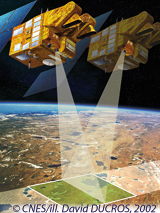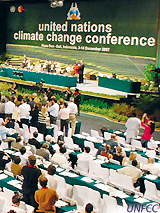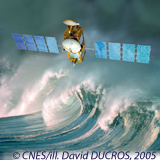|
ITU and Climate Change |
|
||||||||||||
|
Objectives and orientations Developing an effective response to climate change calls for action in virtually all of ITU’s fields of competence. An integrated approach is essential to address the range of technological, scientific, policy, organizational, economic and social issues involved. Within the United Nations system, ITU’s competence in the telecommunications/ICT sector enables it to contribute to nearly all of the main pillars of work under the Bali Roadmap and framework for negotiations, namely science and data monitoring, adaptation, mitigation and technology. At the same time, ITU will reach out to its membership to assist them in combating climate change and in adapting to it, and will engage more fully with other organizations active in this effort. ITU activities on climate change are oriented around four main objectives. Objective 1: Develop a knowledge base and repository on the relation between ICTs and climate change While new technologies and ICT applications can contribute to the reduction of GHG emissions, the rapid uptake in ICT devices, notably in developed countries, increases energy consumption and the need to manage the environmentally sound disposal of e-waste. ITU is engaged in efforts to demonstrate that ICTs are a clean technology for sustainable development and can be a key part of the solution to climate change. The adoption of clean technologies and their safe disposal can assist developing and developed countries alike in their economic and social development. ITU studies can also show how new technologies can be designed to be more energy efficient and can develop further evidence of the beneficial role that ICTs can play in combating global warming. Main orientations
Objective 2: ITU as a strategic leader on ICTs and climate change ITU, through its membership, can demonstrate leadership in showing how ICTs can assist in monitoring, mitigating and adapting to climate change. ITU should also assist its membership in combating climate change, in particular through environmental monitoring, through adoption of energy-efficient devices and networks, dematerialization and disposal standards, through carbon abatement (for example, by using videoconferencing to reduce business travel) and by helping countries to adapt to climate change (for instance by using ICTs for managing natural resources, environmental protection, and for monitoring natural and man-made disasters through emergency telecommunications). Main orientations
Objective 3: Promote a global understanding of the relation between ICTs and climate change As a follow-up to the Bali Conference of December 2007, negotiations will continue towards new global agreements and arrangements on climate change. In 2008, climate change was one of the main topics of the G8 meeting in Japan. ITU followed this work to ensure that the important role of ICTs is properly reflected and to promote an understanding of the link between technology and climate change. Main orientations
|
|






